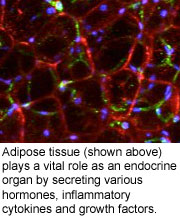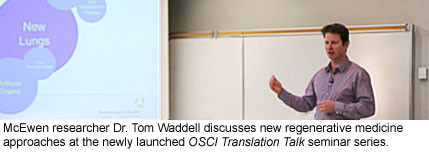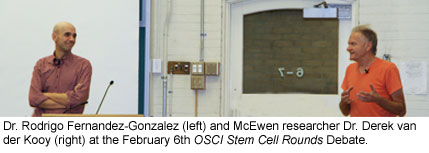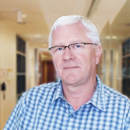Novel Role for VEGF in Adipose Tissue Growth

February 2013 | mcewencentre.ca
 High fat diets lead to adipose tissue expansion accompanied by neovascularization, which is required to meet higher oxygen demands. This neovascularization is promoted by adipose tissues which secrete angiogenic factors such as vascular endothelial growth factor (VEGF). The role of these factors in adipose expansion is not yet fully understood, particularly in obesity where the imbalance between adipose vascularization and tissue expansion is thought to contribute to metabolic defects such as glucose intolerance and insulin resistance.
High fat diets lead to adipose tissue expansion accompanied by neovascularization, which is required to meet higher oxygen demands. This neovascularization is promoted by adipose tissues which secrete angiogenic factors such as vascular endothelial growth factor (VEGF). The role of these factors in adipose expansion is not yet fully understood, particularly in obesity where the imbalance between adipose vascularization and tissue expansion is thought to contribute to metabolic defects such as glucose intolerance and insulin resistance.
In a recent study published in Cell Metabolism, McEwen Centre Researcher Dr. Andras Nagy used in vivo gain and loss of function models to explore the role of VEGF-mediated adipose vascularization in causing metabolic defects. Dr. Nagy and his team found that in vivo ablation of VEGF expression in adipose tissues led to decreased adipose growth and vascular density. Because adipose vascularization and adipose tissue expansion are thought to contribute to metabolic defects, Dr. Nagy’s team (spearheaded by Dr. Hoon-Ki Sung) explored the effects of a high fat diet on mice with an adipose-VEGF deletion. Under these conditions, the VEGF adipose-specific knock out mouse showed heightened adipose tissue inflammation, adipocyte apoptosis, increased insulin resistance and glucose intolerance. Importantly, when VEGF was overexpressed a number of these negative effects were mitigated, including a reduction in total body weight and the complete reversal of glucose intolerance.
These data reveal that vascularization plays a complex role in regulating the metabolic defects, inflammation and adipose tissue growth induced by a high fat diet. Promoting neovascularization by modulating the function of angiogenic factors such as VEGF may therefore be a useful therapeutic intervention when treating obesity-linked metabolic disorders.
Adipose vascular endothelial growth factor regulates metabolic homeostasis through angiogenesis. Sung HK, Doh KO, Son JE, Park JG, Bae Y, Choi S, Nelson SM, Cowling R, Nagy K, Michael IP, Koh GY, Adamson SL, Pawson T, Nagy A. Cell Metabolism. 2013 Jan 8. [Abstract]
This study was supported by a grant from the National Cancer Institute Canada-Terry Fox Foundation, a National Research Foundation of Korea grant, the Korean government and a Premier Summit Award from the Province of Ontario.

An exciting new seminar series, titled Translation Talks, was launched on February 1, 2013 by the Ontario Stem Cell Initiative (OSCI). The series aims to link scientists working on basic stem cell research with clinician scientists in regenerative medicine. The inaugural seminar featured Dr. Janet Rossant (SickKids/University of Toronto), who discussed lung development from embryonic stem cells; the clinical portion of the talk was provided by McEwen Centre Researcher Dr. Tom Waddell, who highlighted current regenerative medicine approaches to treating lung and airway diseases. A webcast of the seminar is available here.
The next OSCI Translation Talks will be held on March 25, 2013, in the Red Seminar Room, 2nd Floor Atrium, Donnelly Centre, 160 College Street from 12:15-1:30 pm. Presentations will be given by McEwen Centre Researcher Dr. Peter Zandstra, Dr. Maarten Egler (Stem Cell Transplantation, SickKids) and Dr. Armand Keating (Orsino Cell Therapy Translational Research Lab, UHN).

On February 6, 2013, the OSCI’s Stem Cell Rounds debate titled "Biomedical engineering has contributed nothing to our knowledge of developmental biology and stem cells" put McEwen Centre Researcher Dr. Derek van der Kooy against Dr. Rodrigo Fernandez-Gonzalez (Institute of Biomaterials & Biomedical Engineering, University of Toronto). Dr. Fernandez-Gonzalez argued that although biomedical engineering has provided numerous tools for research, it is ideas and not tools that drive scientific discovery. Dr. van der Kooy countered that bioengineering has been critical to increasing our understanding of developmental biology and stem cells by putting ideas into practice. Furthermore, bioengineering tools will be critical to help define the complex signalling switches that regulate stem cell self renewal and differentiation. To listen to the spirited debate, click here.
A number of prestigious honours have been recently granted to McEwen researchers: Dr. Molly Schoichet received a Queen Elizabeth II Diamond Jubilee Medal for her contributions to the fields of bioengineering and regenerative medicine; Dr. Shaf Keshavjee has been appointed to the Order of Ontario, the Province’s highest honour, in recognition of his pioneering contributions to the field of lung transplantation; and Dr. Michael Fehlings was presented the Cervical Spine Research Society (CSRS) Presidential Medal for his leadership and contribution to cervical spine research as the 40th President of the CSRS.

Congratulations to Dr. John Dick for receiving a Canada Foundation for Innovation Leading Edge Fund. This award will provide Dr. Dick and his team with the resources required to establish a cutting edge Centre for Cancer Epigenomics. The centre will provide key resources for epigenomics and genomics research to advance personalized medicine for cancer.
|
Selected Publications
Mechanism-based facilitated maturation of human pluripotent stem cell-derived cardiomyocytes. Lieu DK, Fu JD, Chiamvimonvat N, Tung KW, McNerney GP, Huser T, Keller G, Kong CW, Li RA. Circ Arrhythm Electrophysiol. 2013 Feb 7. [Abstract] Ventral tegmental area GABA neurons and opiate motivation. Ting-A-Kee R, Vargas-Perez H, Mabey JK, Shin SI, Steffensen SC, van der Kooy D. Psychopharmacology (Berl). 2013 Feb 8. [Abstract] An examination of the mechanisms by which neural precursors augment recovery following spinal cord injury: a key role for remyelination. Hawryluk GW, Spano S, Chew D, Wang S, Erwin M, Chamankhah M, Forgione N, Fehlings MG. Cell Transplant. 2013 Jan 28. [Abstract] Nicotine-motivated behavior in Caenorhabditis elegans requires the nicotinic acetylcholine receptor subunits acr-5 and acr-15. Sellings L, Pereira S, Qian C, Dixon-McDougall T, Nowak C, Zhao B, Tyndale RF, van der Kooy D. Eur J Neurosci. 2013 Jan 25. [Abstract] Hyaluronic acid click hydrogels emulate the extracellular matrix. Owen SC, Fisher SA, Tam RY, Nimmo CM, Shoichet MS. Langmuir. 2013 Jan 24. [Abstract] Individual characteristics and management decisions affect outcome of anticoagulated patients with intracranial hemorrhage. Hawryluk GW, Furlan JC, Austin JW, Fehlings MG. World Neurosurg. 2013 Jan 18. [Abstract] Hoxa9 transduction induces hematopoietic stem and progenitor cell activity through direct down-regulation of geminin protein. Ohno Y, Yasunaga S, Janmohamed S, Ohtsubo M, Saeki K, Kurogi T, Mihara K, Iscove NN, Takihara Y. PLoS One. 2013 Jan 11. [Abstract] Adipose vascular endothelial growth factor regulates metabolic homeostasis through angiogenesis. Sung HK, Doh KO, Son JE, Park JG, Bae Y, Choi S, Nelson SM, Cowling R, Nagy K, Michael IP, Koh GY, Adamson SL, Pawson T, Nagy A. Cell Metabol. 2013 Jan 8. [Abstract] A hydrogel composite system for sustained epi-cortical delivery of cyclosporin A to the brain for treatment of stroke. Caicco MJ, Cooke MJ, Wang Y, Tuladhar A, Morshead CM, Shoichet MS. J Control Release. 2013 Jan 8. [Abstract]
|
The McEwen Centre for Regenerative Medicine, led by director Dr. Gordon Keller, includes 14 scientists at the University of Toronto and five Toronto hospitals, working to advance the development of more effective treatments for conditions including heart disease, diabetes, respiratory disease and spinal cord injury.
The Centre is located at University Health Network, MaRS Centre, Toronto Medical Discovery Tower, 101 College Street, 8th Floor, Room 701, Toronto, Ontario, Canada M5G 1L7
Email: mcewencentre@uhn.on.ca
Feedback/To Unsubscribe
McEwen Monthly is brought to you by the McEwen Centre for Regenerative Medicine and UHN Research Communications. We hope you have enjoyed receiving this message. If you have any feedback, or if you would prefer to receive the newsletter in text format, please email mkinyanj@uhnresearch.ca.
Some images adapted from the image archives of Wikimedia commons.